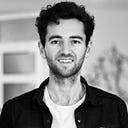Academia vs Industry (or both?)
It’s virtually impossible to introduce our next guest, Maurits Kaptein, in just a few words, so why should I? A psychology graduate, self-taught statistician, distinguished visiting scholar at Stanford University, former Chief Scientist and co-founder of Science Rockstars, public speaker, author of “Persuasion Profiling” and you would almost forget it: a professor Data Science & Health at JADS. An exciting personal story follows with a couple of unexpected twists and a vision for the future.
Transitioning from Psychology to Programming
In 2005 Maurits graduated with a master degree in Economic Psychology from Tilburg University. He has always been very interested in consumer behaviour theories: how do people make decisions and what factors influence this process? What stands out in his educational background is the focus on both qualitative and quantitative research methods. Maurits explains: “Even before I went to university I was fascinated by mathematics. Since I had ample of free time as a psychology major, I had plenty of opportunity to immerse myself in the field of statistics. At some point at the end of my studies, e-commerce was booming and I thought I should really learn programming now. The PDEng program (i.e. post graduate degree) was the perfect opportunity for this: freedom to investigate and learn whatever you want while getting paid. It was absolutely a satisfying 2-year program that taught me a lot.”
“The PDEng program was the perfect opportunity for this: freedom to investigate and learn whatever you want while getting paid.”
To become an academic, it is customary to do a doctorate after your master’s. Did Maurits also take this trajectory into consideration at the time? “I never wanted to do a PhD. In my initial perception researchers literally locked themselves up in a tiny room for 4 consecutive years to undertake all kinds of monotonous activities which were far from practice. In that sense, the PDEng program was more application oriented. At all times I never lost interest in originally theoretical subjects such as mathematics though.”
Books & Beaches
In hindsight it turns out Maurits did choose to pursue an academic career after he had completed his PDEng. He comments on this somewhat remarkable choice given his his former perspective: “During a conference professor Panos Makopoulus asked me if I considered doing a PhD. I said no, except for one case: a research project in close collaboration with industry at a prestigious university.” At first that did not happen: he worked for a market research firm where he developed analysis software and investigated survey results. Nonetheless, 10 months after he had begun working for the firm, the same professor from the TU/e contacted him again for a new research proposal he simply could not refuse: a project funded by Philips where he would spend half of his time at Philips Research and the other half at Stanford University.
Looking back at this period, he concludes that he sincerely enjoyed doing his PhD. “I found out you have lots of freedom and can conduct research in a variety of ways. This is still one of the main drivers for me to stay in academia: you can work on problems you find interesting whenever you want to. That doesn’t mean I don’t work much. In fact, I spent a lot of time on my research. But if the waves were high on, for example, Monday afternoon I went surfing for sure.”
“In academia you can work on problems you find interesting whenever you want to.”
He carries on: “In this respect, a PhD research has few fixed requirements: in the end you must be able to present some deliverable, but its exact specifications are unclear in most cases. The vast majority of researchers find this freedom — especially at the beginning of their doctorate— quite challenging, I loved it however.”
Personalization: a generic problem
In his PhD Maurits paid particular attention to personalised websites: “I tried to select the best version of a website for a visitor given a certain criterium such as profit maximisation or number of clickthroughs. Many people experience this psychological side, especially Cialdini’s persuasion principles (see TED talk below) as very fascinating. However this personalization problem is actually a much broader problem which has broader applications. Most noteworthy I find healthcare where we aim to determine the optimal medicine given the patient’s individual health conditions. In recent years I have worked a lot on this generic problem which I am getting more and more interested in.”
In short, Maurits’ research scope gradually transitioned from marketing to healthcare. It turns out his decision was largely made from a practical standpoint: “The reason I started out in e-commerce is because you can intervene cheaply, easily track website visitors and thus collect data on a large scale. Yet, at the moment I think it’s more fun to apply personalization within a meaningful domain like healthcare. Furthermore, it has become more and more possible over time. For example, during my PhD 7 years ago smartwatches were hardly available.”
Despite the increased availability of health data, he acknowledges that there is still much to be done: “In e-commerce industry practitioners are generally more analytically mature than in the healthcare industry. Hence, now you are seeing that healthcare practitioners show interest in marketers’ best practices.” He elaborates on the status-quo: “At present randomized control is the highest form of knowledge development according to most medical journals. This approach, however, takes a long time and the main problem is that the results will not be representative for an individual. In any case, it will never lead to personalized care. Somehow we need to generalize the trial results to a patient and then adapt it to a group of similar patients.”
“We often make choices based on things we can easily measure, rather than the things we really need to know.”
Another challenge he sees for both marketing and healthcare is choosing the right metrics. “For example, in online marketing the number of clickthroughs is oftentimes chosen as a metric. At the end of the day you hope that this is representative for the Customer Lifetime Value; after all that’s what business is all about. Though, we often make choices based on things we can easily measure, rather than the things we really need to know. The latter is typically much harder to establish and also takes a lot longer. For example, some e-health apps calculate your health status based on the number of daily steps. However, it’s questionable whether that is a good indicator for a healthy and happy life.”
Speaking, Writing, Business and Research
Besides his academic career, Maurits is active in many other areas. Among others he is a professional public speaker for The Next Speaker. I asked him how he ended up there. “My golden tip for becoming a speaker is writing a book (Persuasion Profiling) and also media attention (Wired and FrankWatching) certainly contributed to exposure.”
“My golden tip for becoming a speaker is writing a book.”
In the latter article there is a reference to a start-up (Science Rockstars — later acquired by Webpower) he co-founded in 2012. This company sold a product called the “Persuasion API”. Maurits explains: “The technology is based on an algorithm which determines the optimal follow-up message on a website based on previous clickstreams. In hindsight, I believe it was a rather hacky approach to the problem with a couple of charming ideas which made the algorithm run very fast. But it was definitely a better solution than simply A/B testing, that for sure! You can prove that analytically for elementary examples, or by running simulations.” He continues: “I truly wanted to improve the algorithm. I thought it would be fantastic if we had multiple clients so that we could experiment and establish whether our algorithm actually improved over time. Moreover, I had a long-term vision in mind in which our product would become a platform for website personalisation algorithms. That would be the coolest place to be as a company I think. Also from a commercial point of view it would be a more attractive proposition since we would be a party which offered multiple solutions, rather than just a single one.”
During this entrepreneurial endeavour Maurits encountered many obstacles. “Our clients wanted us to improve what we already had: for example an easier and faster JavaScript implementation process or a nice-looking logo. This is common in business, but I didn’t find these problems that interesting because they have already been solved by thousands of others. As an entrepreneur you should always listen to the voice of the customer and thus deal with requests like these. For me that was the main reason I changed my career path to eventually become a scientist, despite previous concerns about doing a PhD.”
Apparently, Maurits’ opinions about science drastically changed over time. So what are his most recent thoughts about the topic academia vs industry? “To a great extent I believe science allows you to come up with relevant problems yourself. You can twist it any way you want, but in business there is almost always an end customer who determines the matter at issue. Of course you can start out in business first and continue in academia afterwards. After all, as a researcher you can earn a decent living, but if you strive for financial independence I would not recommend it.”
The Future Proof Job
In 2015 Maurits gave a presentation about automation within the accountancy industry (see video below). In this talk he argues that any job which in theory comes down to moving objects from A to B can be fully automated. That is to say, the technology is readily available. However, in many cases we don’t automate these processes yet because it is more expensive than the current way of working. I asked him about the relevance for the data science industry. “In many disciplines technology could essentially replace dozens of job roles but it does not today because the business case is not viable yet and may never be so. The same holds true for the data science industry; data cleaning could theoretically be executed by machines, but in practice it turns out it is financially beneficial to put employees at work. Obviously, this implies the most exciting jobs will remain for data scientists. Still, I think it is even more important that you intrinsically like these non-automated jobs.”
Given these developments, I finally asked him about the most essential skills for future proof data scientists. “I think a lot of data scientists lack statistical comprehension. For example, many people still associate probability theory with calculating p-values and performing significance tests. This knowledge has been mostly irrelevant since the 70’s, it is much more about dealing with uncertainty in mathematical terms. In fact, a common flaw among data scientists is their ability to quantify the uncertainty of predictions. They train a model and assume that it is true; that it represents reality well. Needless to say, the added value of learning more should always be at least considered.”
Hopefully, this article made you critically reflect on the pros and cons of both an academic and entrepreneurial career. Honestly, I could truly empathise with Maurits’ initial thoughts around a post-graduate degree. After all, I sometimes wonder what these brilliant minds are doing all day behind closed doors in a marvellous modern monastery called the Mariënburg. How about you? I am curious to learn more about your opinion about the topic academia vs industry!
In our previous article Rick wrote about his awkward conversation with a rather shy (but stereotype?) developer during the World AI Summit. Fortunately, we had a somewhat more fluent conversation with Maurits resulting in a waterfall of stories and in-depth explanations. Thanks for helping me conduct the interview, Rick 👏!

